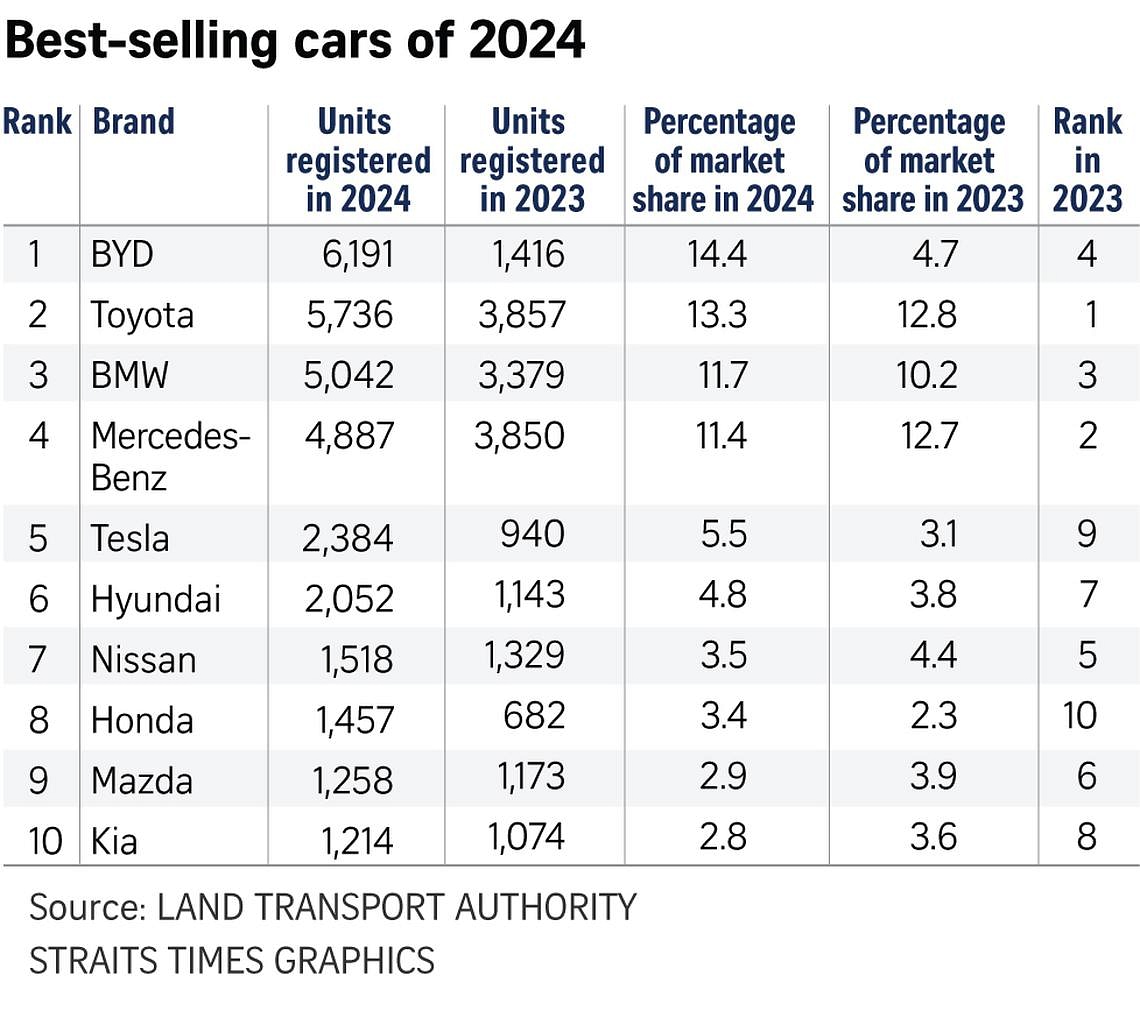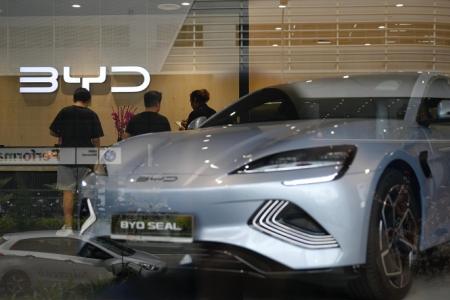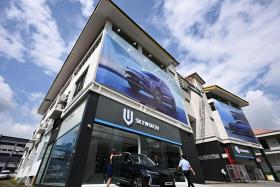BYD tops 2024 new car sales in S’pore, first for a Chinese EV brand
China’s BYD was the best-selling car brand in Singapore in 2024, with 6,191 units registered, beating out Japan’s Toyota and Germany’s BMW.
This is the first time a Chinese electric vehicle (EV) brand has topped the list here.
Based on statistics from the Land Transport Authority published on Jan 17, BYD’s sales accounted for 14.4 per cent of all new car registrations in 2024.
The 6,191 cars it registered comprised models from BYD and those under its luxury arm, Denza, which made its debut here in 2024.
BYD was ranked fourth in 2023, the first time that the Chinese brand made the top 10.
In all, 4,775 more BYD cars were registered in 2024 than in 2023, when 1,416 of its cars were added to the books. This is a 337 per cent increase.
In second place in 2024 was Toyota, which registered 5,736 units through its authorised agent Borneo Motors. These included vehicles from its luxury sub-brand Lexus.
Toyota was the best-selling brand in 2023.
BMW retained its third position, with 5,042 registrations. The brand is represented by two dealers, Performance Motors and Eurokars.
German carmaker Mercedes-Benz slipped from second to fourth place, with 4,887 cars registered.
Tesla is the other EV-only brand on the list aside from BYD. The American brand climbed four spots from ninth to fifth, with 2,384 registrations in 2024.

The other brands on the list offer a mix of internal combustion engine models and petrol-hybrids, although some also have popular EV models.
Overall, there were 43,022 new car registrations in 2024, up from 30,225 in 2023 – a 42.3 per cent increase. This is a reflection of the higher supply of certificates of entitlement, which are needed to register vehicles in Singapore.
While all top 10 brands registered more cars in 2024, four of them – Kia, Mazda, Mercedes-Benz and Nissan – lost ground in terms of their share of the market.
This comes as new brands muscled into the Singapore market in 2024. Dominating the debuts were Chinese EV brands, including Chery with its Omoda and Jaecoo sub-brands, Dongfeng, GAC Aion, Xpeng and Zeekr.
With 14,448 units registered, EVs accounted for 33.6 per cent of car registrations in 2024. This is up from the 5,467 EV units registered in 2023, or 18 per cent of registrations. The bulk of the EVs, or 70.7 per cent, registered in 2024 were from BYD, Tesla or BMW. The remainder came from nearly 30 brands, with some such as Jaguar, Lotus and Nissan managing to register just a handful of units.
On BYD being the first EV brand to top the sales charts here, Mr James Ng, managing director of BYD Singapore and the Philippines, said Singapore’s efforts to promote the switch to EVs, and the strength of the carmaker’s brand globally, played a big part.
He expects EV adoption here to continue growing with the country’s supportive policies.
Asked for his views on the slew of new Chinese EV brands in Singapore, Mr Ng said the company welcomes “the friendly competition”.
“At the same time, BYD is confident that our technology and high perceived value by our customers, along with our attractive pricing and the driving experience that our cars deliver, will keep us ahead.”
Automotive industry consultant Say Kwee Neng believes that Chinese EV brands have an edge in today’s market with rising consumer acceptance, and BYD’s sales will likely remain strong.
Mr Say, who previously headed various motor dealerships in Singapore and abroad, said BYD has taken the right approach towards its business here with competitive pricing and products. The brand also actively works with its dealers to increase the brand’s prominence.
Unlike most other car brands in Singapore, which work with one dealer, BYD uses a network of dealers.
Meanwhile, the market share of parallel-imported cars fell to 12.1 per cent in 2024, from 21.2 per cent in 2023. These are vehicles registered by dealers that are not a brand’s official agent.
Honda was the most popular brand sold by parallel importers. In 2024, there were 2,435 parallel-imported Honda cars registered. This formed 62.6 per cent of total Honda sales for the year, down from 74 per cent in 2023.
The second-most popular parallel-imported brand was Toyota, with 2,140 registrations. This made up 27.1 per cent of total Toyota sales in 2024, up from 25 per cent in 2023.
As for British ultra-luxury carmaker Rolls-Royce, 17.4 per cent – or four – of its cars registered here in 2024 were parallel imports, down sharply from 60 per cent (57 units) in 2023.
Its total registrations tumbled to 23 units in 2024, from 95 in 2023.
Other brands selling multimillion-dollar cars also showed a similar weakening in registrations.
There were 29 Ferrari cars registered in 2024, down from 97 in 2023.
Bentley’s total number of registrations in 2024 was 24, compared with 58 in 2023.
Mr Raymond Ng, a motor trader who specialised in ultra-high-end cars before joining a dealership selling EVs, said the drastically lower registration figures for such vehicles is a continuation of the sharp slowdown in demand from mid-2023, after such cars were slapped with a steeper tax rate of 320 per cent of their value.
As it can take up to 12 months for a built-to-order luxury car to be delivered, he said the true impact of the tax increase on sales was being borne out only in the 2024 numbers.
Get The New Paper on your phone with the free TNP app. Download from the Apple App Store or Google Play Store now


